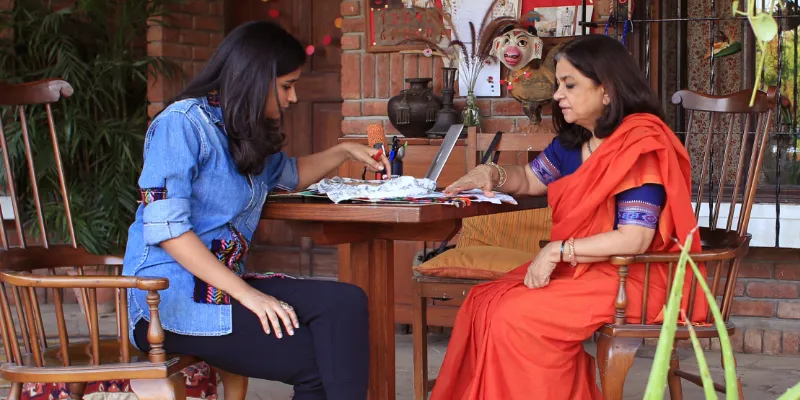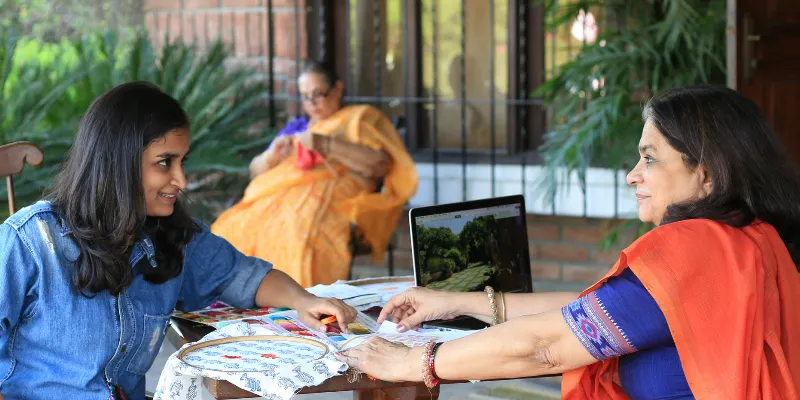How this mother-daughter duo took village artisans and craftsmen to over 20 American cities
Reportage on fashion never fails to gloat about how we Indians are finally meeting western standards of what is referred to as high fashion. But the day we decided to ape and achieve these standards itself is perhaps the biggest blip in our cultural history, the loyal custodians of India’s grand sense of design will tell you.
“Having grown up in Bhopal and Delhi and in the sixties and early seventies, there were no brands or malls. It was a time when as a child you had tailors come home to design and make clothes for you. I have fond memories of playing around my mother and Salam, our tailor, who would make dresses and lehengas in the verandah,” says Divya Bajpai, a veteran in the world of fashion.

Sneak peek into their almirah
Neither of them had any formal training in business or design. Almirah grew out of a passion for textiles and love for Indian techniques like weaving, quilting, printing, and hand embroidery. Created by mother-daughter duo Aditi and Divya Bajpai, Almirah is a treasure trove indeed, of simple, quirky clothes and bedding for children between ages 0 and 12. Their products have an Indian edge and handmade touch that is waning in an increasingly mass produced market. This is maintained through their distinct silhouettes, motifs, prints, and techniques used – not to mention junior Bajpai’s flair for folklore and storytelling through design.
Divya has been an entrepreneur for almost three decades in exports and designing, even started up with Flying Geese Quilts and has since dabbled with design and Indian handicrafts, selling her products to the UK and the US. Aditi joined her mother’s bandwagon for all things Indian and design in 2011 to incept Almirah, with a rather unconventional background- in political science – for a designer. She did her Masters in Political Science at Delhi University.
While she was completing her Masters in 2009, she traveled across North India and became aware of a change that was taking place in modern India: a whole generation of potential craftsmen and artisans were abandoning their traditional skills in the face of industrialisation and lack of opportunities. The recession of 2009 had caused her mother’s garment export business to suffer and many of her karigars (artisans) began to lose their jobs, many of whom she had known since she was little. She knew instantly that she had to salvage this dying breed.
Aditi later went onto pursue a program at Parsons in Design Management. The switch from academia to business and design was hard, and but what was a dichotomy between political science and design is now bridged in their business and how it functions. “It is through Almirah that I hope to bridge the gap between sustainable fashion and the politics of the handicraft sector,” says Aditi.
For the love of all things Indian
Their collections over the years have been memory wears of some sorts. “Our motifs are reminiscent of India, as well as an India of the future. We want to retain the innocence in children through our products and not have them look like mini adults,” says Aditi.

Meanwhile, Divya’s love for patchwork and recycling can be seen in some of Almirah products such as fabric toys, kantha blankets, and hair accessories.
Their products are locally sourced and created by their in-house team of tailors, quilters, and craftsmen who work as collaborators, and sold to retail and individual customers. A major part of their concept is the promotion of fabrics like organic cotton, which we believe is beneficial to all the stakeholders from the farmer to the customer. “The close connection with the tailor and craftsmen, who made your clothes matters, is special. And once people understand that about us, they will pay for our products,” explains Divya.
Skeletons in the almirah
Asking Indians to revert from the new to the old was as much of a challenge as coaxing their staff – comprising of over 200 cottage industry artisans – to revert from the old to the new. One of their biggest challenges has been to motivate and guide artisans, who are equipped with old world skills, and encourage them to adapt to a new market. What calmed their anxiety was seeing the definite benefits and subsequent returns on going digital and hence international, producing in scale and lastly, Aditi and Divya’s open styles of leadership.
“We’re a family of over 30 people across three cities in India. The Almirah family consists of tailors, quilters, printers, sales folk, business developers, consultants, managers, designers and (most definitely) our motifs that help us stay quirky and fun. As a 27-year-old, who is head of the family, I must constantly inspire, motivate, and manage my team. Our work environment is collaborative, open, transparent, and one where people are encouraged to take ownership of their work,” says Aditi.
Almirah was founded in 2011 with one retail outlet in Meher Chand Market in New Delhi and the initial response they got from the customers was stupendous. By 2014, they leveraged the goodwill to open stores in Bengaluru, and thereafter, to the city that never sleeps, Mumbai. Meanwhile, their international business was also blossoming from the get-go. They were selling in boutiques across the US since 2012, and this year, their Spring-Summer line sold across 20 states in the US and abroad, in stores like ABC Carpet and Home in NYC and at Holt Renfrew in Canada as well.
In 2013, kids-wear, at $8.3 billion, constituted 20 percent of India’s apparel market. To capitalise on this global buzz, they launched their website earlier this year. “It’s been a pleasure seeing little guns across places like Singapore, Russia, Thailand, Dubai, Canada, America, and London sport our creations. We do over 600 sales in Meherchand per month and would like to repeat this in other outlets.” The other two stores (Mumbai and Bengaluru) and their online front are fairly new, so the numbers are still trickling in. “We expect to have a more realistic account of the Mumbai and Bengaluru stores by end of the year.” Over the past four years, the SKUs have grown up to over 400.
The leader in the space is Fabindia, the Indian wear brand, which crossed Rs 1,000 crore in sales becoming the largest retail apparel brand in the country.

Coming out of the closet
“Today, women in fashion or women in entrepreneurship seem commonplace but back in the 1970s and 1980s it was a challenge to the norm. The retail sector like most others in India is still largely a man’s world. What we’re doing at Almirah is slightly rebellious – right from gender stereotypes to what’s even considered clothing for kids,” says Divya.
Their short term goals are to build a stronger team of tailors, craftsmen, and managers. In the long term, they want to sculpt Almirah into an international brand. “We hope to take the collaboration between designers and craftsmen to non-textile related sectors as well. We want to follow a model of inclusive growth where we can infuse a sense of both economic and creative stock sharing,” concludes Divya.







